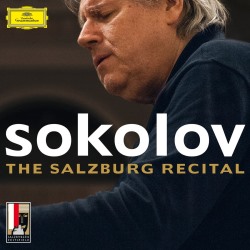
|
The Salzburg Recital
Wolfgang Amadeus MOZART (1756-1791)
Piano Sonata no.2 in F major, K280 [21:48]
Piano Sonata no.12 in F major, K332 [27:03]
Frédéric CHOPIN (1810-1849)
Preludes (24), op.28 [45:09]
Encores
Frédéric CHOPIN
Mazurkas: A minor, op.posth. 68 no. 2 [3:47]; C sharp minor, op.63 no.3 [2:43]
Alexander SCRIABIN (1872-1915)
Poème, op.69, No.1 [2:06] No.2 [1:35]
Jean-Philippe RAMEAU (1683-1764)
Les Sauvages [1:45] from Nouvelles Suites de Pieces de Clavecin
Johann Sebastian BACH (1685-1750)
Chorale Prelude BWV639 Ich ruf' zu dir, Herr Jesu Christ (arr. Sokolov) [3:19]
Grigory Sokolov (piano)
rec. live, 30 July 2008, Salzburg Festival, Haus für Mozart, Salzburg
DEUTSCHE GRAMMOPHON 479 4342 [48:58 + 60:04]
Grigory Sokolov’s recent signing of an exclusive contract for the
‘yellow label’ is welcome news for his die-hard fans. This first
release, a live concert from the 2008 Salzburg Festival, will, I
hope, be the first of many. The pianist doesn’t make studio
recordings, patched together from various takes, but prefers the
spontaneity of the ‘live’ concert situation. He himself says: "From
now on everything will be live, all or nothing, selected from a
mountain of tapes waiting for me in Paris. I cause lots of problems
because I don't believe in editing and splicing - a bit of this, a
bit of that. I never play anything the same way twice, the acoustics
vary from hall to hall and so do the off-stage noises of my
audiences. My producers and engineers tear their hair out on my
behalf but I refuse to compromise. I believe in the real thing."
Sokolov was born in Leningrad in 1950 and gave his first solo performance at the age of twelve. In 1973 he graduated from the Leningrad Conservatory. Seven years previously he had won first prize at the Third International Tchaikovsky Competition in Moscow. His repertoire embraces the classical and romantic, reaching as far back as Byrd, Couperin and Rameau. As an artist he is self-effacing, focusing all of his intellect and energy on the music rather than on the extraneous trappings that are part and parcel of the life of a travelling virtuoso. He doesn’t give interviews, won’t play on a piano more than five years old, and is reluctant to announce the programmes of his recitals until near the time of the concert. He no longer plays with orchestras, explaining that he doesn’t get enough rehearsal time.
Meanwhile, Grigory Sokolov has attained cult status. I have followed his career for many years since my piano teacher introduced me to his recordings in the 1990s. I was fortunate at that time to hear him twice live in concert, both in a solo recital and in a concerto performance. Sadly he no longer gives concerts in the UK, due, I believe, to the stringent visa requirements imposed on visiting artists.
The recital opens with two Mozart piano sonatas, both in F major. Over time I have amassed a large collection of this pianist’s recordings and live broadcasts, and this is the first occasion I have come across anything by Mozart in his discography, so these are of particular interest. Like that other great Russian Sviatoslav Richter, Sokolov observes all repeats. In the repeated sections of some movements he incorporates extra embellishments and ornamentations. These are all tastefully executed. In the Adagio of K332, he opts to play the embellished sections that were printed in the first editions. These are given as an alternative in my own Schott/Universal Urtext, and are rarely played. All Sokolov’s improvisational variants positively add diversity to the readings.
The highlight of this recital for me is Chopin’s 24 Preludes. A previous release of the cycle from a live concert at the Salle Adyar in Paris (17 June 1990) appeared some years ago at the hands of Opus 111; it was later reissued on Naïve in 2007. The two recordings are interpretively not dissimilar, but what commends this new traversal is its sonic superiority. The opening Prelude is taken on the cautious side, but the phrasing and articulation are exquisite. Prelude No. 2 is dark and portentous whilst No. 3 is distinguished with pearl-like semi-quaver left-hand runs, accompanying a sunny upbeat melody. In Nos. 6 and 13 the poetic insights recall that other great Chopin player Alfred Cortot. The more technically challenging Preludes 16 and 19 are delivered with virtuosity and panache. In the hands of Sokolov, No. 17 resembles a song without words. In No. 21 one gets a whiff of nostalgia and melancholy, and No. 24 ends the set in brilliance and triumph.
The Salzburg audience were generously treated to six encores, works that have been at the centre of Sokolov’s repertoire. The Rameau and Bach I found particularly pleasing.
Jessica Duchen provides well-written liner-notes giving some background to this elusive maestro. The recorded sound is superb and immediate, with the Salzburg audience being in no way intrusive. Their enthusiasm and appreciation is suitably registered at the end of each work. The applause says it all.
Stephen Greenbank
 |
 |
|



 All Nimbus reviews
All Nimbus reviews








